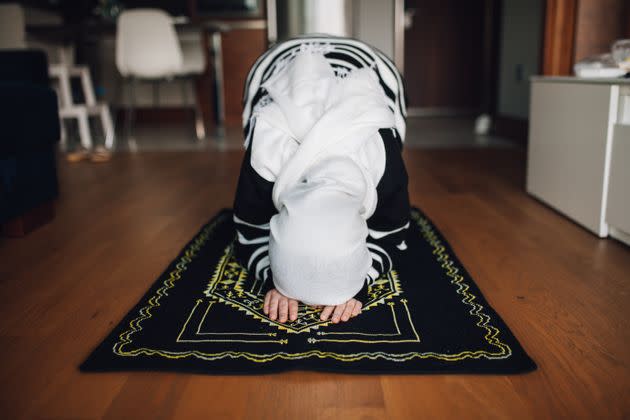Would You Know How To Spot And Stop Islamophobia?
Any form of hate towards a person can be really unsettling, whether it’s about their race, religion, sexuality, gender or a combination of all of these characteristics.
Former England cricket player Azeem Rafiq has been speaking out about the racism he’s faced in the sport, including wine being forced down his throat and the “constant” use of the P word.
The latest government data shows that Muslims are the largest target of religiously motivated hate crimes.
Over the last year, around half of all religious hate crimes were towards Muslims.
What is Islamophobia?
Let’s back up a bit before looking at the definition of Islamophobia.
A group of politicians representing all the different parties, known as an All-Party Parliamentary Group (APPG), was set up in 2019 to come up with a working definition of Islamophobia.
They suggested to definite it as a “type of racism” but two years later and the government haven’t yet settled on a definition.
A government spokesperson says: “We are working to agree a robust definition of Islamophobia and it’s important to take the time to get this right.”

So is there a difference between Islamophobia and racism?
Racism is a belief that one race is better than others. It also means any harmful act or unfair treatment towards someone because of their race.
When talking about Islamophobia, the term encompasses prejudice or hate towards Muslims and the religion of Islam.
The Council Of Europe defines Islamophobia as:
The fear of, or prejudiced viewpoint towards, Islam, Muslims and matters pertaining to them. Whether it takes the shape of daily forms of racism and discrimination or more violent forms, Islamophobia is a violation of human rights.
When acts of Islamophobia or racism are reported to the police they’re known as hate crimes. Hate crimes can also be recorded as a result of ethnicity, gender identity, sexuality, and disability.
In the case of Azeem Rafiq, being subject to drink wine would be seen as a form of Islamophobia as drinking alcohol is not allowed in Islam.
However, when it comes to being called the P word or other derogatory terms because of ethnicity, these would be classed as racial slurs.
It’s common for Islamophobia and racism to go hand in hand when people conflate religion and ethnicity.
Since speaking out, Yorkshire Cricket County Club chairman Roger Hutton has resigned and head coach Andrew Gale has been suspended.
Hutton has “apologised unreservedly” to Rafiq since leaving the club.
Speaking at a parliamentary hearing he said: “To be candid with you, my first desire was to improve the culture at the club more broadly, rather than in relation to discrimination specifically.”
Hope Not Hate, an anti-racism organisation, has started a campaign named #RunOutRacism and are supporting Rafiq in asking for transparency in his case.
They say Rafiq’s experiences are “not isolated” and want to see the issue addressed urgently in the sport.
Watching Azeem Rafiq talk about the racism he has experienced has been heartbreaking. When racism is not taken seriously, or dismissed as ‘good natured banter’, there are real consequences. People get hurt.Nick Lowles, CEO of Hope Not Hate
How to fight Islamophobia?
As November is Islamophobia Awareness Month, organisations are stepping up to educate more people on how to tackle Islamophobia.
MEND, a not-for-profit organisation that encourages British Muslims to get more involved in media and politics, recommend some ways to stand against Islamophobia.
Visit their website, and other anti-racism organisations, to read up on different forms of Islamophobia and racism.
Report any form of Islamophobia to the police (physical attacks, verbal harassment, discrimination).
Get legal advice and support from MEND’s Islamophobia Reporting Unit.
Hold discussions in schools, workplaces, family/friendship groups about making spaces more inclusive.
Look through resources available as part of Islamophobia Awareness Month.
Azhar Qayum, CEO of Mend, says Islamophobic or racist comments “should never be tolerated as banter” and encourages people to call out the behaviour when they hear or see it.
Help and support:
Tell MAMA supports victims of anti-Muslim hate.
Young Minds offers information on racism and mental health for younger people.
SARI (Stand Against Racism and Inequality) provides help to victims of hate.
Stop Hate UK works to challenge all forms of hate.
This article originally appeared on HuffPost UK and has been updated.

 Yahoo News
Yahoo News 